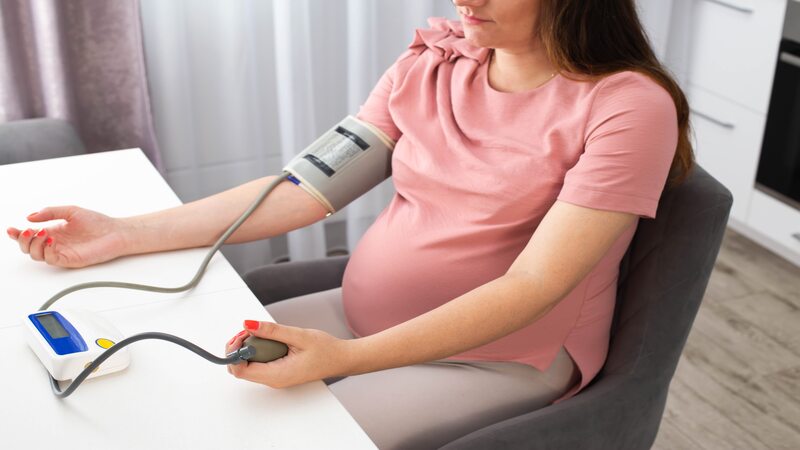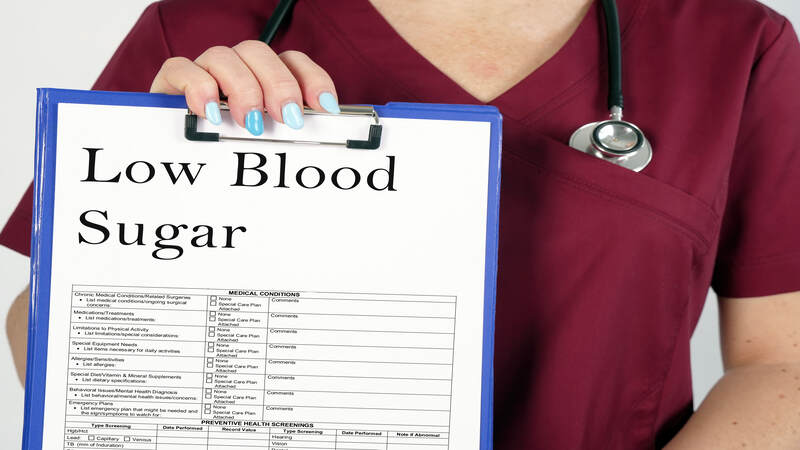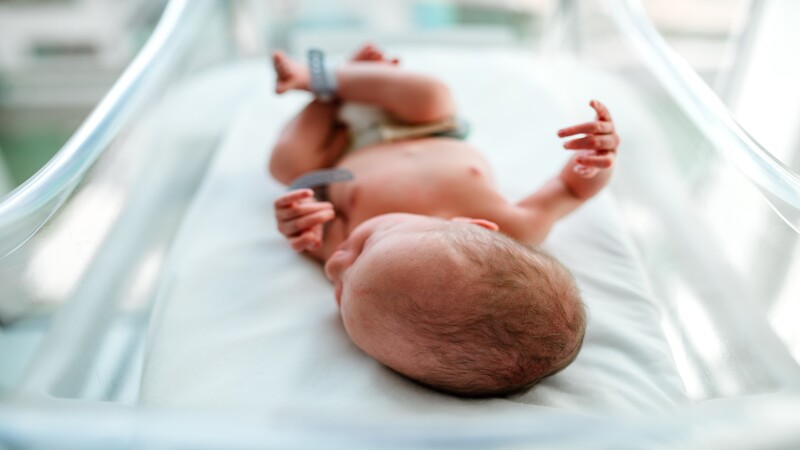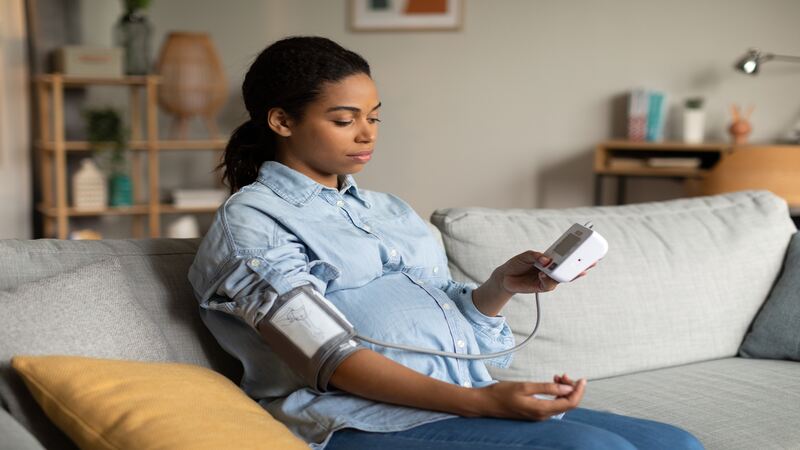 During pregnancy, the body goes through a lot of physiological changes. This is to accommodate the tiny baby growing inside. You might develop some new symptoms, like tiredness and fatigue. If it is troubling you more than normal then make sure that your blood pressure is monitored during each of your antenatal visits.
During pregnancy, the body goes through a lot of physiological changes. This is to accommodate the tiny baby growing inside. You might develop some new symptoms, like tiredness and fatigue. If it is troubling you more than normal then make sure that your blood pressure is monitored during each of your antenatal visits.
Having abnormal blood pressure during pregnancy is a pretty common finding. In most cases, women develop hypertension that requires attention. Though low blood pressure during pregnancy is quite common too and affects a lot of pregnant women. Making a few lifestyle changes might help you, if you are struggling with this.
What Is Low Blood Pressure During Pregnancy?
Blood pressure gives an idea of how well your blood flows. It measures how strongly your blood pushes against the blood vessel walls. Two complements of a blood pressure reading are systolic and diastolic, respectively. Normal blood pressure in pregnancy, according to The American Heart Association guidelines, is any reading less than 120/80 mm Hg. [1] A low blood pressure, or Hypotension, is anything below 90/60 mm Hg. Though hypotension is quite uncommon in comparison to hypertension in pregnancy. Blood pressure tends to be low during the first and second trimesters and begins to rise in the third trimester and near delivery.
Causes of Low Blood Pressure During Pregnancy
The body undergoes various changes during pregnancy, which indirectly affects the blood pressure too. Some of these are cardiovascular changes. Pregnancy causes the blood vessels in the body to expand. This makes the heart put in extra effort to pump the blood effectively. The increase in load on the heart is to make sure that there is enough blood supply for the tiny baby growing inside. [2] A few hormonal changes also contribute to this low blood pressure. Low blood pressure is most common during the first 24 weeks of pregnancy. One more reason contributing to the  lowering in blood pressure is the pressure of the growing uterus over the aorta and abdominal vena cava. It happens in the third trimester. A few other causes can also cause low blood pressure during pregnancy. They are:
lowering in blood pressure is the pressure of the growing uterus over the aorta and abdominal vena cava. It happens in the third trimester. A few other causes can also cause low blood pressure during pregnancy. They are:
- Diabetes
- Certain heart conditions
- Dehydration
- Thyroid conditions
- Low blood sugar
- Internal bleeding
- Allergic reactions
[Read: Pregnancy Gingivitis – Symptoms, Causes and Treatment]
Signs Of Low Blood Pressure During Pregnancy
Pregnancy could be hard for some women and it might get harder if you happen to have low blood pressure too. The signs and symptoms can be distressing and might affect your day-to-day activities. Some of the common symptoms are:
- Dizziness or confusion
- Lightheadedness
- Nausea
- Occasional fainting episodes
- Generalized fatigue
- Pale, cold skin
- Blurred vision or double vision
- Shallow and rapid breathing
It is better to consult your doctor if symptoms persist or occur too often. If you are spending a lot of time lying on the bed then it is better to get yourself evaluated. A thorough check-up becomes important to rule out some other major causes.
Are There Any Risks Of Low Blood Pressure In Babies?
 Babies can be affected by high blood pressure during pregnancy more commonly. The effects of low blood pressure on the baby are not much studied. It can rarely lead to premature delivery, low birth weight and stillbirth. [3] One of the major risks of low blood pressure in pregnancy is accidental falls due to dizziness. This can cause serious injuries to the mother and the baby leading to fatal complications for the developing fetus.
Babies can be affected by high blood pressure during pregnancy more commonly. The effects of low blood pressure on the baby are not much studied. It can rarely lead to premature delivery, low birth weight and stillbirth. [3] One of the major risks of low blood pressure in pregnancy is accidental falls due to dizziness. This can cause serious injuries to the mother and the baby leading to fatal complications for the developing fetus.
[Read: Hydronephrosis in Pregnancy – Symptoms, Causes and Treatment]
How To Deal With Low Blood Pressure During Pregnancy?
 Low blood pressure cannot be completely avoided during pregnancy due to the various physiological and hormonal changes. A few things to help prevent it are:
Low blood pressure cannot be completely avoided during pregnancy due to the various physiological and hormonal changes. A few things to help prevent it are:
- Taking iron supplements.
- Exercise during pregnancy can help boost your low blood pressure. 30 minutes of exercise a day can help improve blood circulation. [4]
- Dehydration must be avoided, as it can lower your blood pressure. Make sure that you are taking enough water and other fluids throughout the day.
- Having a meal before showering can help avoid dizziness during shower time. Many women complain of feeling dizzy while showering.
- Adding some extra salt to your diet can help prevent low blood pressure. You can always carry some snacks or salted nuts handy.
- Avoid sudden changes in position, like standing up too quickly. You should avoid standing up suddenly after lying down for long as this may cause a sudden drop in blood pressure.
- Avoid standing for longer durations, and make sure that you take enough rest during the day.
- Wear compression stockings as they help prevent a drop in blood pressure by reducing venous pooling of blood.[5]
Mostly, low blood pressure during pregnancy does not require any treatment. For patients who have some serious symptoms, a thorough examination becomes necessary. Ruling out other conditions that can cause similar symptoms is important. A few treatment options for serious cases include the administration of Intravenous fluids. To improve fetal outcomes, treatment with corticosteroids can be helpful. [6]
When Should You Visit Doctor?
Due to frequent antenatal check-ups in pregnancy, blood pressure monitoring is done regularly. Though low blood pressure is quite normal in pregnancy, you should know when to see your healthcare provider. Frequent episodes of dizziness and fainting spells require quick medical attention. You should go to a doctor whenever you have any issues with your vision or any feeling of numbness in the body.
So, occasional episodes of lightheadedness are common in pregnancy. But, if the symptoms are really getting bothersome then it is best to monitor your blood pressure and meet your doctor. Low blood pressure can be one of the many causes of constant fatigue and fainting during pregnancy. It is always good to rule out other causes for the better health of yourself and your baby.
FAQ’s
1. Can Walking Reduce BP In Pregnancy?
Yes, walking for about 30-45 minutes a day can help reduce blood pressure. This is a good option for pregnant women with high blood pressure or hypertension. Women with low blood pressure must avoid walking for longer durations.
2. What Is Dangerously Low Blood Pressure?
A very low blood pressure of less than 90/60 mm Hg can become dangerous if dizziness and fainting episodes accompany it. Sometimes very low blood pressure can lead to shock.
3. What Should I Eat If My Blood Pressure Is Low?
Foods containing high amounts of salt are good for people with low blood pressure. They can include salted nuts, crackers, pickles, eggs, meat, and cheese in their diet. It is also important to maintain good hydration.
4. How To Raise Low Blood Pressure During Pregnancy?
Consuming a good diet and ample amounts of fluid during pregnancy is really important to avoid low blood pressure during pregnancy. Also, make sure that you are not standing for longer durations and taking proper rest.
References
- Heart.org, Understanding Blood Pressure Readings – https://www.heart.org/en/health-topics/high-blood-pressure/understanding-blood-pressure-readings
- Kent L. Thornburg, Sig-Linda Jacobson, George D. Giraud, Mark J. Morton, Hemodynamic changes in pregnancy, Seminars in Perinatology, Volume 24, Issue 1, 2000, Pages 11-14 – https://www.sciencedirect.com/science/article/abs/pii/S0146000500800476
- Wiley, The Effects of Chronic Maternal Hypotension During Pregnancy – https://obgyn.onlinelibrary.wiley.com/doi/abs/10.1111/j.1479-828X.1992.tb01888.x
- Zhu, Z., Xie, H., Liu, S. et al. Effects of physical exercise on blood pressure during pregnancy. BMC Public Health 22, 1733 (2022) – https://link.springer.com/article/10.1186/s12889z#
- Giuseppe Latini, Antonio Del Vecchio, Marika Massaro, Alberto Verrotti, Claudio De Felice, Phthalate exposure and male infertility, Toxicology, Volume 226, Issues 2–3, 2006 –
– https://www.sciencedirect.com/science/article/abs/pii/S0928468097001612 - Grünberger, W., Parschalk, O., & Fischl, F. (1981). Behandlung der schwangerschaftsbedingten Hypotonie verbessert kindliche Prognose [Treatment of hypotension complicating pregnancy improves fetal outcome]. Medizinische Klinik, 76(9), 257–260. – https://pubmed.ncbi.nlm.nih.gov/7024767/
Read Also: Stomach Ulcers During Pregnancy

